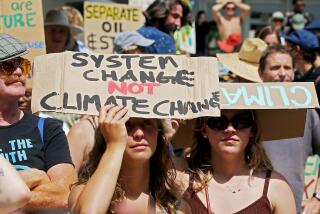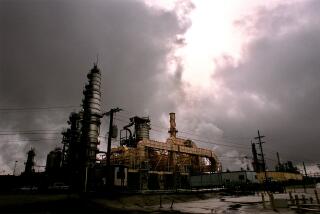Experts Blame Saudis, Kuwaitis as Spill, Oil Fires Go Unchecked
WASHINGTON — Efforts to extinguish the oil well fires raging in Kuwait and to cope with other aspects of the worst man-made environmental disaster in history are being hampered by confusion, poor planning and bureaucratic indifference by Kuwaiti and Saudi officials, a Senate panel was told Thursday.
Among the problems being ignored is crude oil that continues to spill into the Persian Gulf from damaged Kuwaiti facilities at a rate of about 3,000 barrels per day--the equivalent of one Exxon Valdez spill every 12 weeks, environmental experts testified.
“Unfortunately, the Kuwaiti government has done little, if anything, to stop the spillage,” oil spill expert Richard Golob said at a hearing of the Senate’s Gulf Pollution Task Force.
Sen. John Chafee (R-R.I.) said that he felt “despair, consternation and confusion” over the lack of progress in stemming the leaks or putting out the more than 500 oil well fires still raging in Kuwait. “I put the blame on the Kuwaiti government,” Chafee said.
Brent Blackwelder, vice president of Friends of the Earth, an environmental group, noted that Exxon spent more than $2 billion and enlisted more than 11,000 people to help clean up the 1989 Exxon Valdez disaster, which dumped 260,000 barrels of oil into Alaskan coastal waters.
By contrast, about 400 people and $60 million have been allocated so far to deal with the damage caused by the estimated 2 million to 4 million barrels of oil spilled into the Persian Gulf during the war with Iraq, Blackwelder said.
Golob blamed many of the difficulties on poor planning, bureaucratic “confusion” and reluctance by Saudi Arabia, off whose coast the slick quickly spread, to invest more money in cleanup efforts.
Describing the oil field fires as a scene “from Dante’s ‘Inferno,’ ” Chafee cited Environmental Protection Agency figures estimating that the fires are releasing 500,000 tons of pollutants per day into the atmosphere. That is roughly equivalent to 10 times the amount emitted by every industry and power plant in the United States combined.
Blackwelder and Golob appealed to Congress and the Bush Administration to take a more active role by assigning U.S. military personnel in the Gulf to the cleanup.
More to Read
Sign up for Essential California
The most important California stories and recommendations in your inbox every morning.
You may occasionally receive promotional content from the Los Angeles Times.










